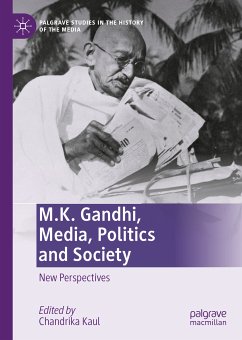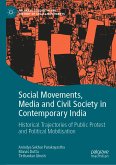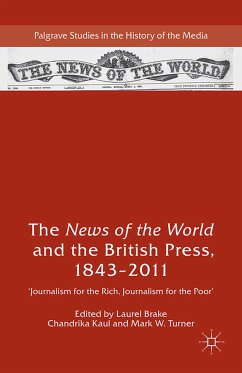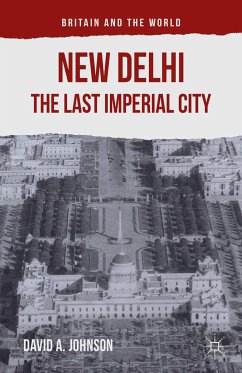This Palgrave Pivot showcases new research on M.K. Gandhi and the press, telegraphs and popular culture. Despite Gandhi being the subject of numerous books over the past century, there are few that put journalism centre stage. This edited collection explores both Gandhi's own approach to the press, but also how different advocacy groups and the media within India and overseas engaged with Gandhi, and his ideology and methodology, to further their own causes. The timeframe of the book extends from the late nineteenth century up to the present, and the case studies draw inspiration from a number of disciplinary approaches.
Dieser Download kann aus rechtlichen Gründen nur mit Rechnungsadresse in A, B, BG, CY, CZ, D, DK, EW, E, FIN, F, GR, HR, H, IRL, I, LT, L, LR, M, NL, PL, P, R, S, SLO, SK ausgeliefert werden.
"This edited book brings Gandhi's checkered relations with media to the centre-stage of analysis, thereby exploring Gandhi both in national and international contexts. The work thus virtually draws inspiration from disciplinary fields such as history, politics, literary and religious studies, media and popular culture." (Arun Bandopadhyay, Journal of the Asiatic Society, Vol. 64 (2), 2022)
"It is highly rich in content, many of facts presented and analysed in this book are either not known or not much talked in public space. ... this book contains a wealth of authentic information about Mahatma Gandhi. It provides objective analysis of his thinking and actions, which shaped the history of that period. It has messages for all of us today and will be relevant even tomorrow. It is highly recommended across all spectrum of humanity." (Vishwa Mohan Katoch, Indian Journal of Leprosy, Vol. 93, 2021)
"The book is an exploration of Gandhi's tryst with modernity, a world order which he apparently repudiated and was yet unable to dispense with altogether. ... Chandrika Kaul's book has been eminently successful, as promised by her, in filling in the many absent themes in the very scanty scholarly considerations of Gandhi's utilization of media politics to negotiate the Raj, and in relocating these themes firmly in a comprehensive discursive universe shaped by the conjunction of Gandhi, media, politics and society." (Tapan Basu, The Book Review, Vol. 45 (4), April, 2021)
"It is highly rich in content, many of facts presented and analysed in this book are either not known or not much talked in public space. ... this book contains a wealth of authentic information about Mahatma Gandhi. It provides objective analysis of his thinking and actions, which shaped the history of that period. It has messages for all of us today and will be relevant even tomorrow. It is highly recommended across all spectrum of humanity." (Vishwa Mohan Katoch, Indian Journal of Leprosy, Vol. 93, 2021)
"The book is an exploration of Gandhi's tryst with modernity, a world order which he apparently repudiated and was yet unable to dispense with altogether. ... Chandrika Kaul's book has been eminently successful, as promised by her, in filling in the many absent themes in the very scanty scholarly considerations of Gandhi's utilization of media politics to negotiate the Raj, and in relocating these themes firmly in a comprehensive discursive universe shaped by the conjunction of Gandhi, media, politics and society." (Tapan Basu, The Book Review, Vol. 45 (4), April, 2021)









